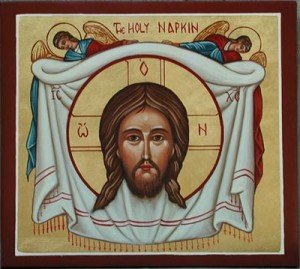 Our Eastern Catholic Church believes that the Bible is God’s word, revealed for the salvation of humanity. Our doctrine holds that God inspired the writing of the Bible in its original languages, but that translations, by their very nature, are not inspired. There has been a real effort in more recent years to make sure that any translations, especially English ones, are based on texts in their original language, which has typically been Greek. We believe that the true focus of the Bible is the incarnation of Christ and the salvation of humanity above all else. Our Church doesn’t take a stand on the issue of Biblical inerrancy. Since the late 19th century, rigid stands on biblical inerrancy has caused divisions in Protestantism. One of the great problems is that many more modern churches base their interpretation of Scripture on English translations. We do not take a rigid, fundamental approach to the Bible and turn to the Fathers of the Church and their expressed understanding of Sacred Scripture in an attempt to discern the meaning of our sacred writings. Without Tradition as a guide, we cannot, we believe, come to any real understanding of the Scriptures. The early Christian church had the task of sorting through various religious texts to decide which were authentic and authoritative. The 66 books selected are called the Canon. The Eastern Church accepts the 66 books of the Old and New Testament and also recognizes a series of texts which have come to be known as the deuterocanonicals. These are books from the Old Testament and include Tobit, Judith, Sequel of Esther, Wisdom of Solomon, Wisdom of Joshua, Baruch, Sequel of the Book of Daniel, 1 Maccabees, 2 Maccabees and Psalm 151. Protestants reject the deuterocanonicals entirely and Roman Catholics recognize only seven. Because Christians felt that the books of the Old Testament were an integral part of Christianity, they decided which of the Old Testament books they saw as In the following issue I will share more about the deuterocanonicals.
Our Eastern Catholic Church believes that the Bible is God’s word, revealed for the salvation of humanity. Our doctrine holds that God inspired the writing of the Bible in its original languages, but that translations, by their very nature, are not inspired. There has been a real effort in more recent years to make sure that any translations, especially English ones, are based on texts in their original language, which has typically been Greek. We believe that the true focus of the Bible is the incarnation of Christ and the salvation of humanity above all else. Our Church doesn’t take a stand on the issue of Biblical inerrancy. Since the late 19th century, rigid stands on biblical inerrancy has caused divisions in Protestantism. One of the great problems is that many more modern churches base their interpretation of Scripture on English translations. We do not take a rigid, fundamental approach to the Bible and turn to the Fathers of the Church and their expressed understanding of Sacred Scripture in an attempt to discern the meaning of our sacred writings. Without Tradition as a guide, we cannot, we believe, come to any real understanding of the Scriptures. The early Christian church had the task of sorting through various religious texts to decide which were authentic and authoritative. The 66 books selected are called the Canon. The Eastern Church accepts the 66 books of the Old and New Testament and also recognizes a series of texts which have come to be known as the deuterocanonicals. These are books from the Old Testament and include Tobit, Judith, Sequel of Esther, Wisdom of Solomon, Wisdom of Joshua, Baruch, Sequel of the Book of Daniel, 1 Maccabees, 2 Maccabees and Psalm 151. Protestants reject the deuterocanonicals entirely and Roman Catholics recognize only seven. Because Christians felt that the books of the Old Testament were an integral part of Christianity, they decided which of the Old Testament books they saw as In the following issue I will share more about the deuterocanonicals.
The canon of Judaism looks very much like the Protestant Christian “Old Testament.” The Jewish Canon seems to have centered around the so-called Masoretic Text, which is in Hebrew. It is probable that books whose only extant editions were in Greek were considered less authentic.
